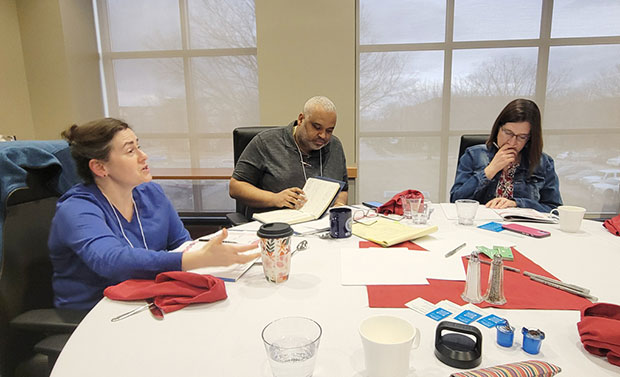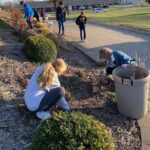
From left, Rachel Suddarth, Ryan Saddler and Nicky Gant discuss ideas about what St. Ambrose University in Davenport might offer a refugee family they are hosting. A day-long training conference was held with St. Ambrose, World Relief and Tapestry Farms staff.
By Anne Marie Amacher
The Catholic Messenger
DAVENPORT — Three partner groups that collaborated to bring a refugee family to the Quad Cities last year participated recently in a training session to brainstorm how to garner more support for the family and for possible future refugee families.
Every Campus a Refuge (ECAR) and NASH Refugee Resettlement Initiative led the daylong training for St. Ambrose University, World Relief Quad Cities and Tapestry Farms. The three groups support a Congolese refugee family of eight on the St. Ambrose campus. The family includes children ages 1-13, some of whom attend Davenport schools and receive English as a Second Language (ESL) lessons.
Nicky Gant, St. Ambrose’s service and justice coordinator, serves on a committee to support the refugee family, which lives on campus rent-free. The team offers help with preschool carpools, house maintenance and “practical support along with access to our library and other campus facilities.”
Gant meets regularly with Tapestry Farms, World Relief and ECAR members at St. Ambrose to “coordinate and work together to support our ECAR family and facilitate partnerships.” Some members of the St. Ambrose community meet separately with Tapestry Farms and World Relief to work on projects related to refugee resettlement.
Faculty, staff and students are dedicated to serving vulnerable populations, such as refugees, Gant said. “Every Campus a Refuge is just one more way for us to engage in our community. I have no doubt that the relationships that were facilitated, along with the empowering information from the recent training will inspire even stronger ties between St. Ambrose and community organizations that work to serve refugees.”
ECAR’s founder Diya Abdo led the training in person and Gul Inanc, founder of Opening Universities for Refugees, presented via Zoom. Abdo suggested that the three partner groups reach out to other higher education campuses such as Augustana College in Rock Island, Illinois. “Engage other schools and communities,” she said. She also encouraged the partners to explore other ways to assist the refugee family now.
Abdo shared examples from other public and private campuses across the U.S. to assist refugee families, such as offering employment, enrolling a refugee student on campus, offering campus services such as use of the fitness center. Also, consider offering English as a Second Language and space for refugee families to engage in art or music. Invite family members to attend campus clubs or play soccer with the children. One campus, inspired by the program, developed a minor studies related to refugees.
“Your campus is like a city. There are amenities, buildings and resources. And you have partners out in the community,” Abdo said. During a brainstorming session at the St. Ambrose training, attendees explored ideas to assist refugee families. One big need is childcare. What sites offer affordable childcare? Could creation of a babysitting club help the parents have some time together? Personal invitations to the family to attend events on campus, was another idea.
When it comes to fundraising, Abdo said, check with businesses about donating a percentage of sales on a given day or night toward the refugee program. A business might donate gift cards or items such as bicycles and helmets for the children.
Students on campus could host a drive to collect food, diapers and other items for a refugee family and invite the public to participate. Ryan Saddler, St. Ambrose’s associate vice president for diversity, equity and inclusion, suggested sponsoring “Bees for Refugees” during a football or soccer game. People in the wider community attending the event could bring donations to the game. “Put a call out to the community. Leverage your power,” Abdo said.
Inanc spoke about efforts worldwide to support refugees. “You are working for them (refugees) and with them,” she said. “We live in a multicultural society, not an intercultural one.” An intercultural society understands and has respect for all cultures. She also spoke of ways for refugees to share what they have been through, such as an art display.
The final part of the training involved brainstorming for the future. One idea: get more students campus-wide involved in knowing about the refugee family. Reach out for assistance from clubs, sports teams and other groups.
St. Ambrose, World Relief Quad Cities and Tapestry Farms will continue to meet and work on plans now and for the future. Gant reached out to attendees last week “to make an action plan moving forward. There was a lot of energy and motivation to move forward and deepen our commitment to ECAR here on campus and involve additional departments.”











